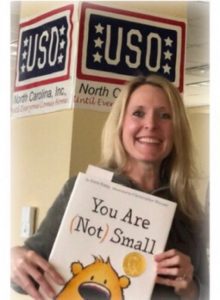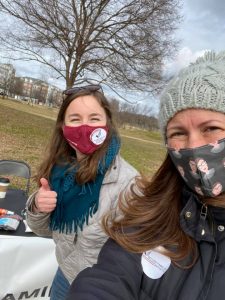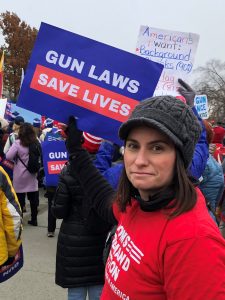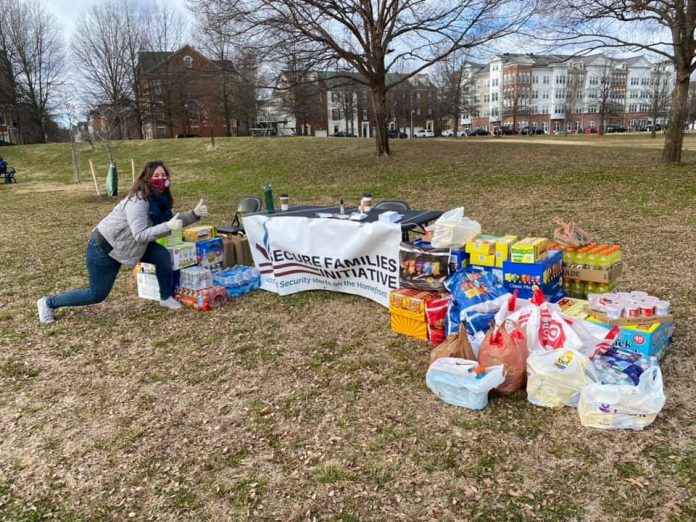Military spouses routinely hold volunteer roles in both the military community as well as their civilian community. In a 2018 Blue Star Families Military Family Lifestyle Survey, “among the 71% of military and veteran family respondents who volunteered in the past 12 months, 17% volunteered on military installations and 83% volunteered in their civilian communities”.
There are various reasons why spouses choose to volunteer, ranging from meeting new people, to supporting a cause they are passionate about, or for filling gaps in their resume when they are unable to work.
It’s clear that military spouses value opportunities to volunteer. But, what are the most important considerations when seeking out volunteer work and how can spouses choose their volunteer positions wisely?
I had the opportunity to share my experience as a volunteer and to interview two military spouses about their experiences volunteering, keying in on what factors are most important to them.
Wendi Iacobello

Wendi spent over six years (2014-2020) volunteering with the USO in North Carolina; first as a special event volunteer with the USO of Raleigh-Durham International Airport Center, and then as a story time volunteer at the USO of North Carolina Fort Bragg Center.
Her interest in volunteering with the USO started before she became a military spouse. “My family was very pro-military growing up,” stated Iacobello. She chose to volunteer at the USO in order to give back to the military community. When she became a military spouse, Wendi said that her volunteerism led to opportunities to connect with other spouses and give back in a different and very meaningful way.
Wendi’s long time commitment as a USO volunteer in North Carolina has positively impacted her life. “The USO made me feel appreciated,” she stated. “They celebrated moments in my personal life, such as my pregnancy, and it was very common for the staff and volunteers to celebrate [special events] together”.
In addition to building community with the USO through celebrations, she also praised the organization for their “great onboarding process”. She explained that at the USO, “they allow volunteers to have ownership and share their ideas or help improve a process”.
Most importantly, as a military spouse, she valued the flexibility she had with her volunteer hours. She was able to volunteer as often or as little as possible depending on her schedule. Flexibility is key for military spouses, as service members’ schedules are often unpredictable, and they are the main caregivers of their family.
In October 2020, Wendi, her husband, and their toddler PCS’d to Fort Sill in Oklahoma. She recently began a new position as an Instructional Designer at the University of Oklahoma. Seeking volunteer opportunities that aligned with her professional skills, she connected with a friend and began serving as the Director of Adult Education for the Bautista Project in 2021. The Bautista Project provides basic living essentials, educational resources, support groups, and other necessary resources to assist homeless community members with reintegration. This volunteer position with the Bautista Project is remote. However, Wendi admits that she prefers in-person volunteering. In a 2019 interview, Iacobello said, “ I encourage all military spouses to be your own person apart from the service member and find support, groups, and activities that will help bring joy and balance into your life”. For many of us spouses, volunteering can be one of those activities.
Sarah Streyder

Sarah is an advocate, organizer, and proud military spouse who is committed to helping other military partners and family members raise their voices on foreign policy issues that affect their lives. She is the Executive Director of Secure Families Initiative (SFI). Six months after founding SFI, Sarah had received many inquiries from military partners and family members eager to volunteer. Since then, SFI has created a space and opportunity for spouses like me to become involved in the important work at SFI.
As SFI has organically welcomed passionate volunteers who advocate for voting and diplomacy-first foreign policy, Sarah has spent much time thinking about how SFI wanted to design their volunteer corps. While Sarah is opposed to uncompensated labor, she understands that many organizations cannot afford to pay all volunteers. A few organizations may offer stipends, but the majority are unable to do so. Instead, Sarah does like to offer the maximum that SFI can afford. As a token of appreciation, she praises volunteers and tries to send them small “thank yous” like gift cards for their time. SFI also does everything possible to connect volunteers to activities that help build their professional portfolios.
When we discussed what spouses should look out for when volunteering, she suggested that they, “should ask lots of questions before committing their time.” Interestingly, Sarah’s personal volunteer experience has been outside of the military community. When she moved to Nebraska with her Air Force husband in 2017, Sarah volunteered with political campaigns for candidates who supported issues that were important to her. With a background in public policy, Sarah made the educated decision to spend her time volunteering on topics adjacent to policy issues. It was important to her to gain knowledge and transferable skills. Sarah and I discussed in depth the key factors that spouses should consider when seeking out volunteer opportunities.
My Own Experience
My volunteering as a military spouse started in our local community while stationed in Greater New Orleans area. My children began attending religious school at our synagogue, and a friend suggested I consider the family liaison role because all of the in-person volunteer hours would take place when my children were in class on Sundays. This arrangement worked really well for me.
After a year of coordinating snack schedules and supporting the education director, we PCS’d to Washington, DC. Towards the end of our New Orleans tour, I made the choice to step away from being a full-time classroom teacher when our youngest experienced a health scare. Once we moved to our next duty station (DC) and her medical issues were resolved, I was eager to serve my local community again.
Through social media I heard about a local meeting for Moms Demand Action for Gun Sense in America, a grassroots organization founded the day after the Sandy Hook shooting with a mission to reduce gun violence. I knew my time would be worthwhile if I chose to spend it advocating and supporting an issue that spoke to me – gun violence prevention.
As an extrovert, the ability to attend in-person monthly meetings and meet like-minded moms (and dads, grandparents, etc) supporting this cause was what I needed. I participated in outreach opportunities where I was able to utilize my Spanish to educate and speak with Latinos about the importance of gun safety and gun reform. DC had recently passed a Red Flag law, and I was sharing this information with the community.

A favorite memory was attending a rally at the Supreme Court demanding action from our legislators. I had a very positive experience volunteering for Moms Demand Action. They provided ample training, multiple opportunities for volunteers, and most importantly, they worked with local organizations to impact change and reduce gun violence in DC.
When the COVID pandemic hit, I still continued virtual meetings with Moms Demand Action, and I am now a member of the New Orleans chapter of Moms. Meanwhile, I heard about a training being offered by Secure Families Initiative (SFI) called “Politics: Do’s and Don’ts for Milspouses”. I was intrigued by the topic and after attending the training session, I decided to inquire about becoming a volunteer with SFI. Over a year later, I’ve had the opportunity to lead training sessions with SFI for other military spouses to attend. Most recently, I co-led the “How to: Tell Your Story” training in May 2021 during SFI’s Civic Engagement Bootcamp. In addition to finding additional meaningful work, I also met Sarah Streyder!
Based on my conversations with Sarah and Wendi, I have outlined important factors to consider when seeking out volunteer opportunities:
- What is the onboarding process for volunteers?
- Will the organization provide training, and if so what kind?
- Does the organization take a personal approach to volunteers?
- What is the philosophy when assigning work to volunteers? Does the organization consider volunteer interests and experience?
- Do the volunteer position responsibilities relate to my professional goals?
- Is there a social networking aspect?
- Is the volunteer position remote or in-person?
- Are there a minimum number of hours that volunteers must commit to or is the organization flexible?
- Are there one-time opportunities to volunteer or is the organization looking for volunteers to make a long term commitment?
“Research has found that there are benefits to being civically engaged. Adults who volunteer are found to experience health benefits including longevity, mobility, and mental health”. As a spouse, it was important to me to find meaningful volunteer opportunities to contribute to my local community. If you are also seeking something extra, consider volunteering, too!











